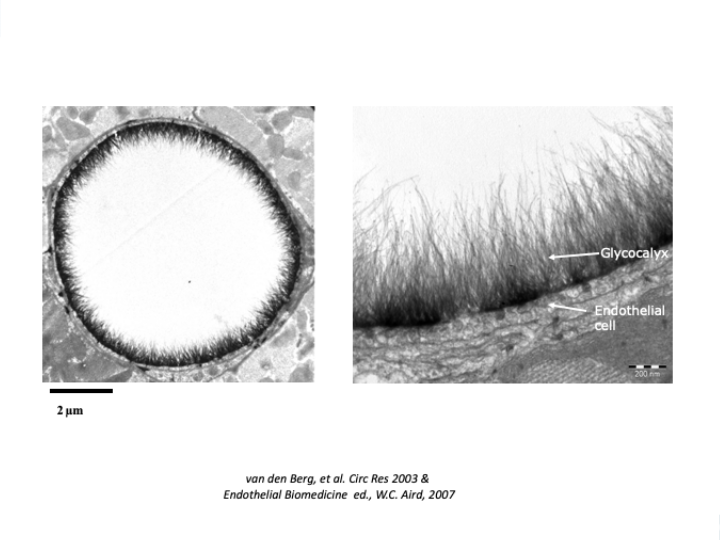
Cardiovascular disease continues to increase in America, holding steady as the number one killer. Traditional cardiovascular risk factors like waist-to-hip ratio are well known, and are the standard for care. Those include: diabetes, hypertension, dyslipidemia, smoking, and family history of premature heart disease, physical inactivity, and body weight and composition.1
But these risk factors can overlook early vascular damage. Further, even the best risk factor assessment tools can over- or under-estimate risk for any individual.2
Within the vascular system, an early sentinel exists. The inner lining of the blood vessels – the endothelial glycocalyx – protects the endothelium, regulates vascular permeability, stores antioxidants and coagulation factors, and much more. Damage to the endothelial glycocalyx often precedes vascular disease.3 As one group of researchers stated:
“[The endothelial glycocalyx] is increasingly recognized as an early indicator of endothelial injury and a potential marker of vascular injury.”4
What is the Endothelial Glycocalyx?
Like the microbiome, the EGX is a ubiquitous, tiny, fragile, dynamic —and resilient— structure. The EGX lines every blood vessel in the body – all 60,000 miles of veins, arteries, capillaries, and microcapillaries. The EGX is a microscopically thin gel-like layer of glycoproteins, proteoglycans and glycosaminoglycans.

A damaged EGX has systemic vascular effects:
- Impaired vascular permeability
- Penetration of cholesterol and other molecules to the endothelium
- Coagulation challenges
- Reduced antioxidant and nitric oxide storage and availability
The health of the endothelial glycocalyx is a proxy for vascular health. You cannot have one without the other.
What damages the Endothelial Glycocalyx?
The glycocalyx is extremely dynamic. It can be compromised very rapidly, literally within minutes to hours. It rebuilds more slowly. The following factors have been shown to degrade the EGX in clinical studies in vitro, in animal studies, or in humans.
Top lifestyle factors that degrade the EGX include:
- Smoking5
- High-sugar diets6
- Physical inactivity7
- Stress
Top environmental factors that degrade the EGX include:
- Air pollution8
- Aging9
- Genetics
- Systemic Inflammation10
- Trauma11
Avoiding all of these factors simply isn’t possible. Most patients have at least one risk factor for EGX damage, which means their vascular health is likely at risk. The good news is that the EGX is incredibly resilient.
Like the microbiome, the EGX responds to supportive measures. Its dynamic nature enables improved systemic health.
References
-
Schenck-Gustafsson K. Traditional Cardiovascular Disease Risk Factors. 3rd edition. Oxford University Press, Revised April 2020. doi:10.1093/med/9780198784906.003.0676_update_001 Accessed October 20, 2020. https://oxfordmedicine.com/view/10.1093/med/9780198784906.001.0001/med-9780198784906-chapter-676
-
Lin JS, Evans CV, Johnson E, et al. Nontraditional Risk Factors in Cardiovascular Disease Risk Assessment: A Systematic Evidence Report for the U.S. Preventive Services Task Force [Internet]. Rockville (MD): Agency for Healthcare Research and Quality (US); 2018 Jul. (Evidence Synthesis, No. 166.) 1, Introduction. Available from: https://www.ncbi.nlm.nih.gov/books/NBK525929/
-
Alphonsus CS, Rodseth RN. The endothelial glycocalyx: a review of the vascular barrier. Anaesthesia. 2014 Jul;69(7):777-84. doi:10.1111/anae.12661
- Liew H, Roberts MA, MacGinley R, McMahon LP. Endothelial glycocalyx in health and kidney disease: Rising star or false Dawn? Nephrology. 2017;22(12):940-946. doi:10.1111/nep.13161
- Ikonomidis I, Marinou M, Vlastos D, Kourea K, Andreadou I, Liarakos N, Triantafyllidi H, Pavlidis G, Tsougos E, Parissis J, Lekakis J. Effects of varenicline and nicotine replacement therapy on arterial elasticity, endothelial glycocalyx and oxidative stress during a 3-month smoking cessation program. Atherosclerosis. 2017 Jul;262:123-130. doi:10.1016/j.atherosclerosis.2017.05.012
- Nieuwdorp M, van Haeften TW, Gouverneur MC, Mooij HL, van Lieshout MH, Levi M, Meijers JC, Holleman F, Hoekstra JB, Vink H, Kastelein JJ, Stroes ES. Loss of endothelial glycocalyx during acute hyperglycemia coincides with endothelial dysfunction and coagulation activation in vivo. Diabetes. 2006 Feb;55(2):480-6. doi:10.2337/diabetes.55.02.06.db05-1103
-
Wagenmakers AJ, Strauss JA, Shepherd SO, Keske MA, Cocks M. Increased muscle blood supply and transendothelial nutrient and insulin transport induced by food intake and exercise: effect of obesity and ageing. J Physiol. 2016;594(8):2207-2222. doi:10.1113/jphysiol.2014.284513
- Li Y, Hu C, Wang P, et al. Indoor nanoscale particulate matter-induced coagulation abnormality based on a human 3D microvascular model on a microfluidic chip. J Nanobiotechnology. 2019;17(1):20. Published 2019 Feb 1. doi:10.1186/s12951-019-0458-2
-
Machin DR, Bloom SI, Campbell RA, Phuong TTT, Gates PE, Lesniewski LA, Rondina MT, Donato AJ. Advanced age results in a diminished endothelial glycocalyx. Am J Physiol Heart Circ Physiol. 2018 Sep 1;315(3):H531-H539. doi:10.1152/ajpheart.00104.2018
-
Martin L, Koczera P, Zechendorf E, Schuerholz T. The Endothelial Glycocalyx: New Diagnostic and Therapeutic Approaches in Sepsis. Biomed Res Int. 2016;2016:3758278. doi:10.1155/2016/3758278
- Dogné S, Flamion B. Endothelial Glycocalyx Impairment in Disease: Focus on Hyaluronan Shedding. Am J Pathol. 2020 Apr;190(4):768-780. doi:10.1016/j.ajpath.2019.11.016
IMPORTANT NOTICE:
The information on this webpage is for licensed healthcare practitioner education only, and is not to be disseminated to the general public.



